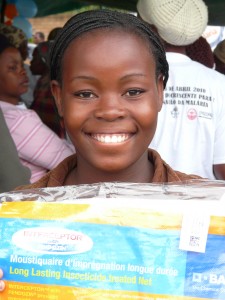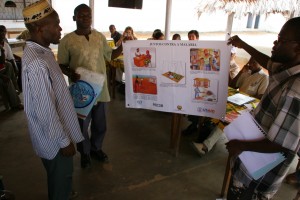The U.S. Agency for International Development (USAID) engages religious leaders to facilitate greater partnership in, as well as ownership of, a community’s development.

PIRCOM has trained more than 21,000 religious leaders from a variety of faiths on malaria prevention and treatment. Source: USAID
Religious leaders, along with their well-established networks of volunteers and community groups, have the potential to promote and sustain positive changes in the social norms, attitudes, and behaviors of their communities, which can affect development outcomes. Thus, the U.S. Agency for International Development (USAID) engages religious leaders to facilitate greater partnership in, as well as ownership of, a community’s development.
Over the past few years, malaria and other global health programs have increased support to grassroots health movements within faith communities. In addition to promoting health-seeking behaviors, these programs have helped bridge cultural and religious divides. One such initiative, the Together Against Malaria (TAM) program, arose in 2006 from the common vision of national leaders from 10 faith communities in Mozambique to use their religious organizations to disseminate malaria control messages and commodities. TAM’s goal was to train religious leaders on key malaria control and prevention messages so they could reach members of their communities with malaria messages – a goal that has been met with great success.
TAM was designed to determine whether grassroots religious organizations could become accessible and effective partners with existing public health interventions. The TAM partners sought to maximize the vast reach and influence of religious organizations in remote areas where government clinics and programs do not exist. The challenge was to shape these scattered houses of worship into a functional system for the delivery of malaria control education and commodities, overcoming geographic and religious differences. The TAM partners recognized that the disparate faith-based organizations must be intentionally unified, organized, developed, and supported if TAM was to be an effective and sustainable mechanism for disease prevention.
With the help of the Center for Interfaith Action on Global Poverty, at the Washington National Cathedral, the founding religious leaders of TAM formed the Inter-religious Program against Malaria (PIRCOM, in Portuguese) – a Mozambican nongovernmental organization (NGO) established to carry out TAM’s program activities. The Adventist Development and Relief Agency served as PIRCOM’s in-country implementing partner in Mozambique. The TAM program was supported by a three-year initial grant from the President’s Malaria Initiative (PMI), which is led by USAID and implemented jointly with the Centers for Disease Control and Prevention.

These religious leaders have reached more than 1.5 million congregants across Mozambique with the life-saving messages. Source: USAID
To date, PIRCOM has trained more than 21,000 religious leaders from a variety of faiths on malaria prevention and treatment. These religious leaders have in turn reached more than 1.5 million congregants across Mozambique with the life-saving messages. Through PIRCOM, the religious leaders established a unique and powerful community network – one that can complement national and multinational efforts against malaria, as well as other diseases and poverty-related issues.
In addition to achieving the desired health-related outcomes, PIRCOM’s malaria prevention and control program has served as a noncontroversial tool to promote interfaith collaboration and dialogue on a broader scale.
While working together to promote malaria prevention and control in their communities, PIRCOM members have recognized the importance of their new relationships across faith lines. Imam Mussagy Remane, who is from the Islamic Congress of Mozambique and is a member of the provincial PIRCOM in Sofala, observed: “The most important thing is that we came to know each other. It was strange for me to be in a church; I had never spoken to a pastor – it was kind of a taboo. Malaria brought us together, brought us inside each other’s communities. Today we know many people from different faith groups.” Mussagy said that he no longer worries that tension between Christians and Muslims might spill over into his community because “by being busy with malaria together, people have come to know each other very well.”
Pastor Paul Viegas, pastor of the Assemblies of God Church and member of the provincial PIRCOM in Zambezia, echoed these sentiments: “I had never been in a mosque and had no personal access to Muslim leaders. We understand now we have problems in common, and we start to collaborate.” The religious leaders believe PIRCOM is an innovative national faith-based program for malaria and public health in Mozambique.
The U.S. Government is committed to working with a broad range of partners, most importantly national governments, as well as multilateral and bilateral institutions and private sector organizations. During the past year, PMI expanded collaboration with the private sector, NGOs, and faith-based organizations. These groups often have strong bases of operation and high degrees of influence in underserved rural areas, where the burden of malaria is greatest.
